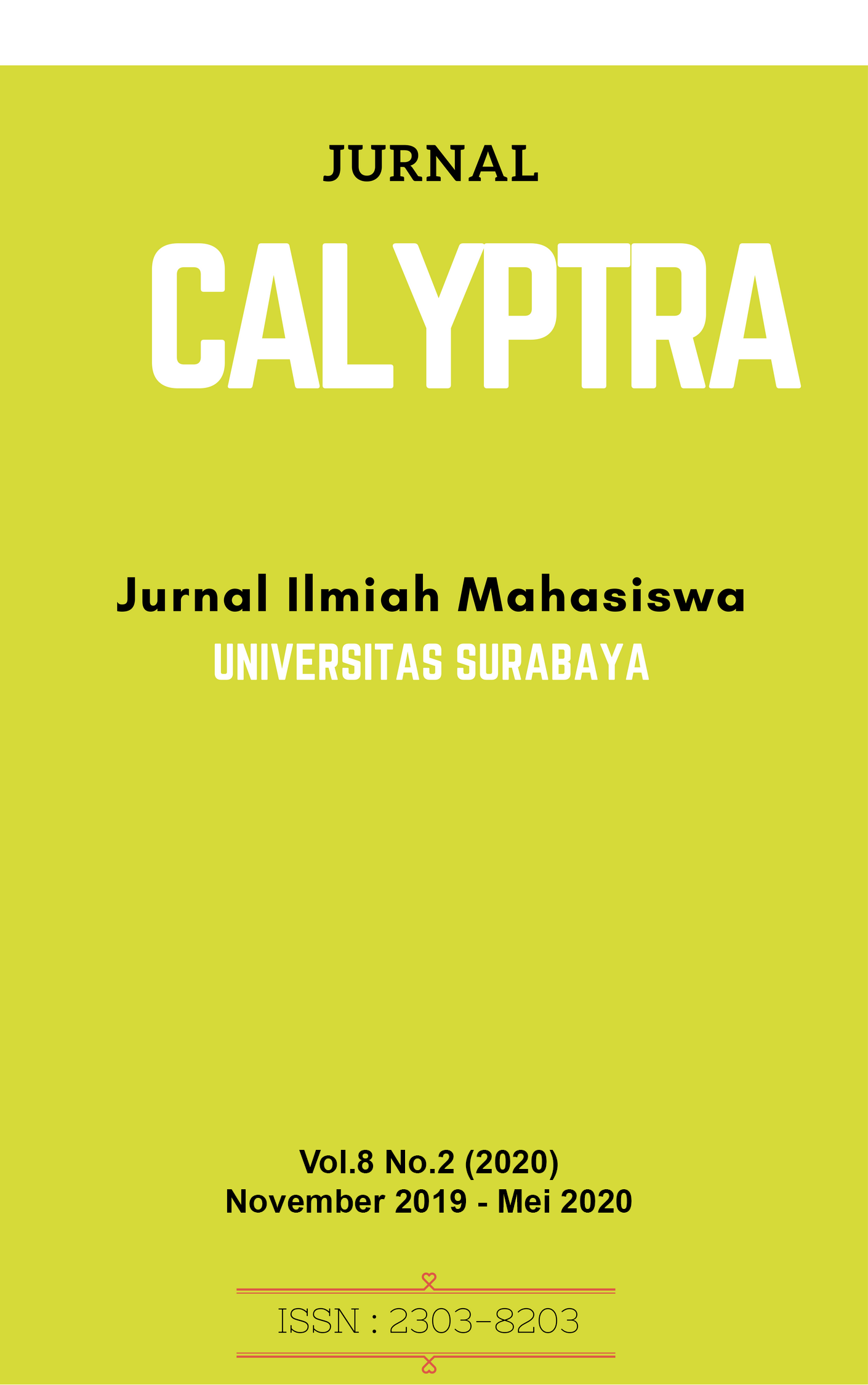Pengaruh Penamaan Produk oleh Konsumen terhadap Purchase Intention dengan Psychological Ownership sebagai Mediator
 Abstract Views:
316 times
Abstract Views:
316 times
 PDF Downloads:
272 times
PDF Downloads:
272 times
Abstract
Abstrak--Tujuan penelitian ini adalah untuk mengetahui pengaruh penamaan produk dengan purchase intention dengan psychological ownership sebagai mediator. Pada penelitian ini, partisipan berjumlah 40 orang mahasiswa dengan usia minimal 18 tahun. Pengambilan sampel dalam penelitian ini menggunakan teknik simple random sampling. Penelitian ini menggunakan pendekatan kuantitatif dan metode pengambilan data dengan cara metode eksperimen dengan membandingkan perbedaan rerata tiap kelompok. Pengumpulan data menggunakan perlakuan dan kuesioner yang berisi data demografi, angket terbuka, dan alat ukur yang digunakan adalah Purchase Intention dan Psychological Ownership yang telah diadaptasi oleh peneliti. Teknik analisis data pada penelitian ini menggunakan analisis statistic, uji beda paired t-test, path analysis untuk menganalisis mediator serta crosstabs. Hasil dari penelitian ini sebagai berikut : (1) Product naming dengan metode self-naming memiliki pengaruh yang signifikan dengan purchase intention melewati psychological ownership. (2) Product naming memiliki pengaruh signifikan terhadap purchase intention (Mself-name = 13.90, p<0.05). (3) Product naming memiliki signifikan terhadap psychological ownership (Mself-name = 14.90, p<0.05). Hal ini berarti bahwa ketika konsumen berpartisipasi dalam pembuatan produk, maka konsumen akan secara tidak langsung merasa memiliki produk tersebut yang akan bisa meningkatkan minat pembelian.. Penelitian ini dapat diterapkan ke masyarakat luas untuk memperkenalkan produk baru.
Kata kunci: Product naming, Self-name, Purchase Intention, Psychological Ownership
Abstract--This research aims to determine the impact of product naming to purchase intention using psychological ownership as a mediator. A total number of 40 university students are conducted as participants minimum age of 18 years. The sampling in this study using a simple random sampling techniques. This research is a quantitative research and using experiment to collect the data. Experiment in this research is used to compare the average differences between each group. Data collection uses a questionnaire including demographic data, open-questions, and a Purchase Intention and Psychological Ownership scale that has been adapted by researcher. Data analysis uses statistical analysis, paired t-test, and path analysis to analyse the mediator and crosstabs. The results of this research are as follows: (1) Product naming with self-naming method has a positive and significant impact to purchase intention through psychological ownership. (2) Product naming has a positive and significant impact to purchase intention (Mself-name = 13.90, p<0.05). (3) Product naming has a positive and significant impact to psychological ownership (Mself-name = 14.90, p<0.05). This shows that when consumers participate in a product manufacturing process, consumers will indirectly feel of owning the product and increase an interest in purchasing. This research can be applied to a wider range to promote new products.
Keywords: Product naming, Self-name, Purchase Intention, Psychological Ownership
Downloads
References
Azwar, S. (1997). Reliabilitas dan Validitas. Yogyakarta: Pustaka Pelajar.
BPS. (2017, Desember 15). Retrieved April 7, 2018, from https://www.bps.go.id/statictable/2009/04/16/970/penduduk-15-tahun-ke-atas-yang-bekerja-menurut-lapangan-pekerjaan-utama-1986---2017.html
Chi, H. K., Yeh, H. R., & Yang, Y. T. (2009). The Impact of Brand Awareness on Consumer Purchase Intention: The Mediating Effect of Perceived Quality and Brand Loyalty. The Journal of International Management Studies, Volume 4, Number 1, 135-144.
Gabler, N. (2015, January 15). The Weird Science of Naming New Products. Retrieved May 01, 2018, from https://www.nytimes.com/2015/01/18/magazine/the-weird-science-of-naming-new-products.html
Franke, N., & Piller, F. (2004). Value Creation by Toolkits for User Innovation and Design: The Case of the Watch Market. The Journal of Innovation Management , 401-415.
Fuchs, C., Prandell, E., & Schreier, M. (2010). The Psychological Effects of Empowerment Strategies on Consumers' Product Demand. Journal of Marketing Vol. 74, 65-79.
IndonesiaInvestments. (2017, September 05). Penduduk Indonesia. Retrieved April 7, 2018, from https://www.indonesiainvestments.com/id/budaya/penduduk/item67?
Jussila, I. (2015). Individual Psychological Ownership : Concepts, Evidence, and Implications for Research in Marketing. Journal of Marketing Theory and Practice, 121-139.
Kumar, P., Meng, T., & Kabiraj, S. (2018). Effect of Crowdsourcing on Consumer Brand Perceptions and Behavioral Intentions. Business Perspectives and Research, 1-17.
MARS Indonesia. (2015). Perilaku Belanja Konsumen Indonesia 2015. Retrieved April 07, 2018, from http://www.marsindonesia.com/products/business-reports/perilaku-belanja-konsumen-indonesia-2015
Natalya, L., & Widyakristi, K. V. (2016). Validitas Alat Ukur. In I. B. Siaputra, & L. Natalya, Teori dan Praktik Cara Asyik Belajar Pengukuran Psikologis (p. 39). Surabaya.
Peck, J., & Shu, S. B. (2009). The Effect of Mere Touch on Perceived Ownership. Journal of Consumer Research, Vol. 36, No. 3, 434-447.
Pierce, J. L., Kostova, T., & Dirks, K. T. (2001). TOWARD A THEORY OF PSYCHOLOGICAL OWNERSHIP IN ORGANIZATIONS. The Academy of Management Review, Vol. 26, No. 2, 298-310.
Pierce, J. L., Kostova, T., & Dirks, K. T. (2003). The State of Psychological Ownership: Integrating and Extending a Century of Research. Review of General Psychology, 84–107.
Stoner, J. L., Loken, B., & Blank, A. S. (2017). The Name Game: How Naming Products Increases Psychological Ownership and Subsequent Consumer Evaluations. Journal of Consumer Psychology, 130-137.

This work is licensed under a Creative Commons Attribution-ShareAlike 4.0 International License.
- Articles published in CALYPTRA are licensed under a Creative Commons Attribution-ShareAlike 4.0 International license. You are free to copy, transform, or redistribute articles for any lawful purpose in any medium, provided you give appropriate credit to the original author(s) and the journal, link to the license, indicate if changes were made, and redistribute any derivative work under the same license.
- Copyright on articles is retained by the respective author(s), without restrictions. A non-exclusive license is granted to CALYPTRA to publish the article and identify itself as its original publisher, along with the commercial right to include the article in a hardcopy issue for sale to libraries and individuals.
- By publishing in CALYPTRA, authors grant any third party the right to use their article to the extent provided by the Creative Commons Attribution-ShareAlike 4.0 International license.



